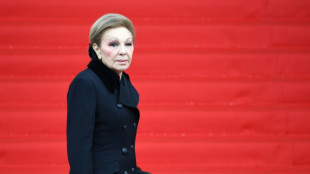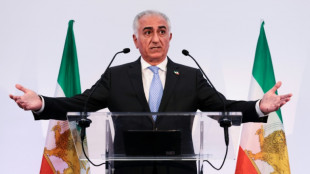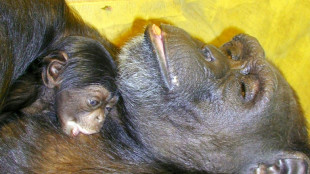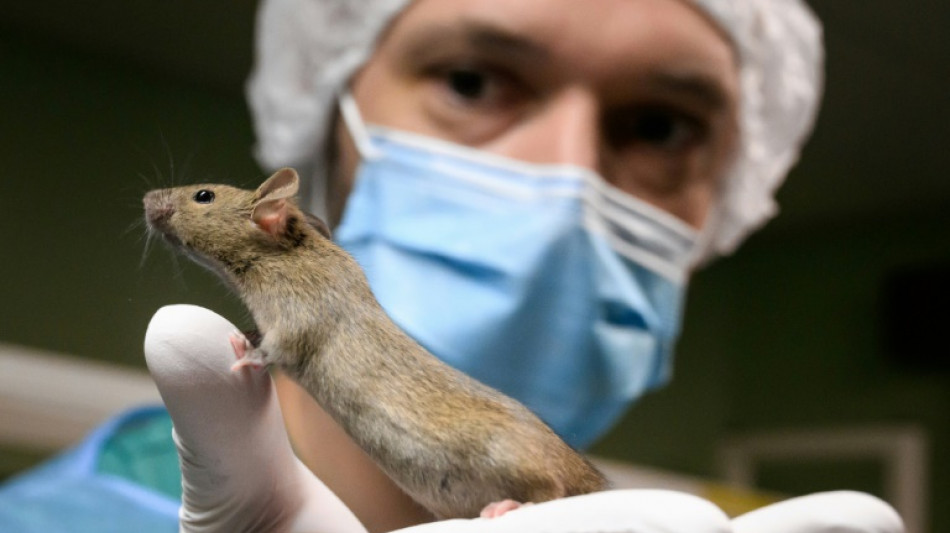
-
 France's Moutet booed for underarm match point serve in Melbourne
France's Moutet booed for underarm match point serve in Melbourne
-
Zverev happy with response after wobble in opening Melbourne win

-
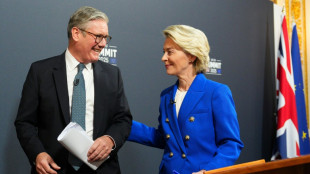 'Bring it on': UK's Labour readies for EU reset fight
'Bring it on': UK's Labour readies for EU reset fight
-
New Zealand's Wollaston wins again to lead Tour Down Under

-
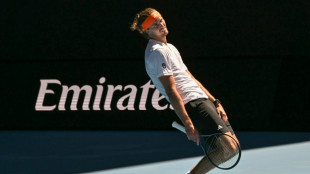 Zverev wobbles but wins at Australian Open as Alcaraz enters fray
Zverev wobbles but wins at Australian Open as Alcaraz enters fray
-
British qualifier upsets 20th seed Cobolli to make mum proud
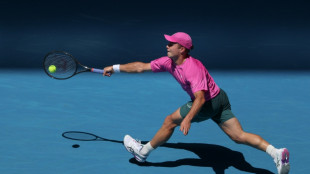
-
 Zverev drops set on way to Australian Open second round
Zverev drops set on way to Australian Open second round
-
Indonesian rescuers find debris from missing plane
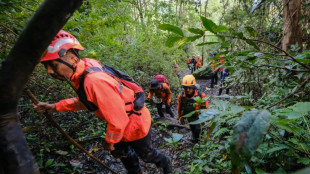
-
 Wembanyama scores 39 as Spurs overcome Edwards, Wolves in thriller
Wembanyama scores 39 as Spurs overcome Edwards, Wolves in thriller
-
Heartbreak for Allen as Broncos beat Bills in playoff thriller

-
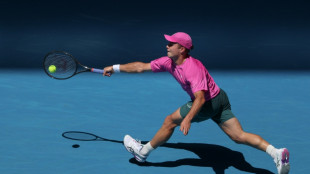 British qualifier upsets 20th seed Cobolli in Melbourne
British qualifier upsets 20th seed Cobolli in Melbourne
-
Paolini races into round two to kickstart Australian Open
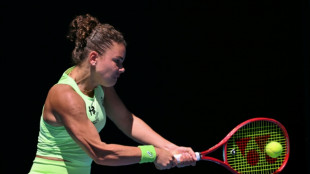
-
 Portugal presidential vote wide open as far-right surge expected
Portugal presidential vote wide open as far-right surge expected
-
Lutz kicks Broncos to overtime thriller as Bills, Allen fall short

-
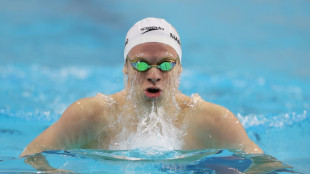 Marchand closes Austin Pro Swim with 200m breaststroke win
Marchand closes Austin Pro Swim with 200m breaststroke win
-
Raducanu says Australian Open schedule 'does not make sense'

-
 Australia great Martyn says he was given '50/50 chance' of survival
Australia great Martyn says he was given '50/50 chance' of survival
-
Top-ranked Alcaraz, Sabalenka headline Australian Open day one
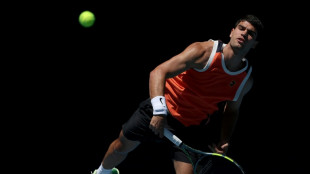
-
 Haiti security forces commence major anti-gang operation
Haiti security forces commence major anti-gang operation
-
NFL's Giants ink John Harbaugh as new head coach

-
 Skipper Martinez fires Inter six points clear, injury-hit Napoli battle on
Skipper Martinez fires Inter six points clear, injury-hit Napoli battle on
-
NASA moves moon rocket to launch pad ahead of Artemis 2 mission

-
 Silver reveals PSG talks over NBA Europe plan
Silver reveals PSG talks over NBA Europe plan
-
Iran leader demands crackdown on 'seditionists' after protests

-
 Carrick magic dents Man City Premier League bid as Arsenal held
Carrick magic dents Man City Premier League bid as Arsenal held
-
Kane scores as Bayern deliver comeback romp over Leipzig

-
 Arteta angry as Arsenal denied penalty in Forest stalemate
Arteta angry as Arsenal denied penalty in Forest stalemate
-
Glasner feels 'abandoned' by Palace hierarchy

-
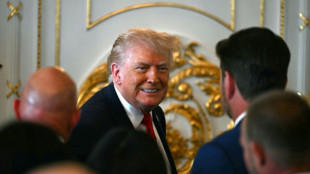 Israel objects to line-up of Trump panel for post-war Gaza
Israel objects to line-up of Trump panel for post-war Gaza
-
Dupont guides Toulouse to Champions Cup last 16 after Sale hammering

-
 Arsenal extend Premier League lead despite drawing blank at Forest
Arsenal extend Premier League lead despite drawing blank at Forest
-
Kane scores in Bayern comeback romp over Leipzig

-
 Skipper Martinez fires Inter six points clear, Napoli squeeze past Sassuolo
Skipper Martinez fires Inter six points clear, Napoli squeeze past Sassuolo
-
Lookman gives Nigeria third place after AFCON shoot-out with Egypt

-
 Thousands march in France to back Iranian protesters
Thousands march in France to back Iranian protesters
-
Egadze glides to European figure skating gold

-
 Lens hold off Auxerre to retake top spot from PSG
Lens hold off Auxerre to retake top spot from PSG
-
Trump threatens Europe with tariffs over Greenland as protesters rally

-
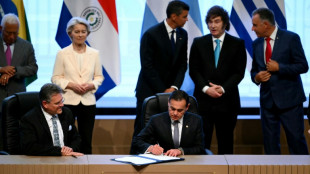 EU, Mercosur bloc ink major trade deal, reject 'tariffs' and 'isolation'
EU, Mercosur bloc ink major trade deal, reject 'tariffs' and 'isolation'
-
Feinberg-Mngomezulu captains Stormers into Champions Cup last 16

-
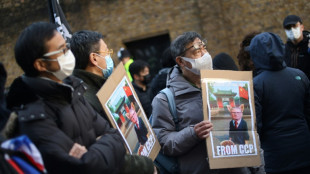 Hundreds in London protest against Beijing 'mega embassy'
Hundreds in London protest against Beijing 'mega embassy'
-
Man Utd hurt City title hopes as Spurs flop again

-
 Last-gasp Can penalty gives Dortmund win against St Pauli
Last-gasp Can penalty gives Dortmund win against St Pauli
-
Greenland protesters tell Trump to keep US hands off Arctic island

-
 Skipper Martinez fires Inter past Udinese and six points clear
Skipper Martinez fires Inter past Udinese and six points clear
-
Carrick urges consistency from 'fantastic' Man Utd after derby win

-
 Man City well beaten by 'better' Man Utd, concedes Guardiola
Man City well beaten by 'better' Man Utd, concedes Guardiola
-
Real Madrid overcome Bernabeu boos to record Arbeloa's first win

-
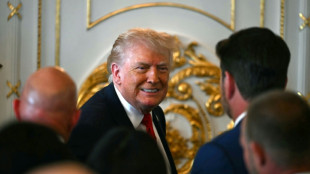 Trump invites more leaders to join Gaza 'Board of Peace'
Trump invites more leaders to join Gaza 'Board of Peace'
-
Man Utd dominate Man City in dream start for Carrick


Animal testing put to the test in Swiss vote
Switzerland goes to the polls Sunday to decide whether animal and human testing should be banned -- a proposal that has triggered an outcry in a country heavily reliant on big pharma.
Opinions suggest that the proposal by animal rights defenders is highly unlikely to pass.
But if it did, "Switzerland would be the only country internationally with such a ban," said Yves Fluckiger, president of the Swiss universities lobby group.
Researchers insist that medical progress is impossible without experimentation.
At the University of Geneva, Patrycja Nowak-Sliwinska, head of the molecular pharmacology laboratory, unveils her cell incubator where intestinal organoids from cancer patients are being cultivated.
These structures, made up of cells, make it possible to test a large number of potential treatments.
"With the in vitro model, we try to find promising candidates" -- and only the latter would then be tested on animals, said Nowak-Sliwinska, who received a prize rewarding researchers who work to replace animals with other methods.
But even she said it would be impossible to do all the research without animal experimentation and clinical trials.
This is why the university's Faculty of Medicine has an animal facility in the basement housing some 25,000 animals -- mostly mice and rats.
- Strict protocols -
Inside, Professor Doron Merkler conducts research to find a treatment for a form of multiple sclerosis.
The research could not advance without using mice, into which he injects modified cells to observe how the disease affects the nervous system.
The mouse he is working on is showing symptoms: instability, difficulty moving, and partial paralysis of the limbs.
The experiments are framed by a strict protocol regarding their degree of severity, and animal keepers are trained to detect when an animal is not well.
"If no veterinary care can be provided to the animal, we can decide with the researcher to sacrifice it," said Pierre Bonnaventure, head of animal facilities at the faculty.
In Switzerland, researchers seeking to use live animals must make a formal request, establish that there is no alternative method available and that the conditions imposed on the animals will be as light as possible.
The number of animals used has consequently fallen sharply, from nearly two million per year in the early 1980s to around 560,000.
Some 20,000 animals a year undergo severe interventions, such as the implantation of a tumour, according to federal authorities.
- Proposal 'goes too far' -
Under Switzerland's direct democracy system, campaigners collected enough signatures to trigger a popular vote.
The proposal would outlaw experiments not only on animals but on humans too, as well as ban the importation of new drugs developed through such means.
"Animal experiments should be considered a crime," Renato Werndli, a doctor among those who launched the initiative, told AFP.
All the major political parties in Switzerland are against the proposal.
For the government, the ban "goes too far" and would have "serious consequences for health" -- and also for the economy, in a country where the chemical and pharmaceutical sector represents just over half of all exports.
Interpharma, the Swiss pharmaceutical industry's lobby group, warned that in the event of a ban, "the institutions and companies concerned would be forced to relocate their activities abroad".
Switzerland has already rejected three initiatives on the subject -- in 1985 (70 percent), 1992 (56 percent) and 1993 (72 percent) -- and is expected to do likewise this time.
But it remains to be seen whether the majority will be as big, in a society where animal welfare has grown in importance.
For Samia Hurst, a bioethicist at the University of Geneva, the new initiative commits "a fairly frequent mistake, which is to target biomedical research".
However, she told AFP: "Animal experimentation, among the various uses that humanity makes of other species, is both the most closely monitored and undoubtedly the most justified."
F.Müller--BTB


